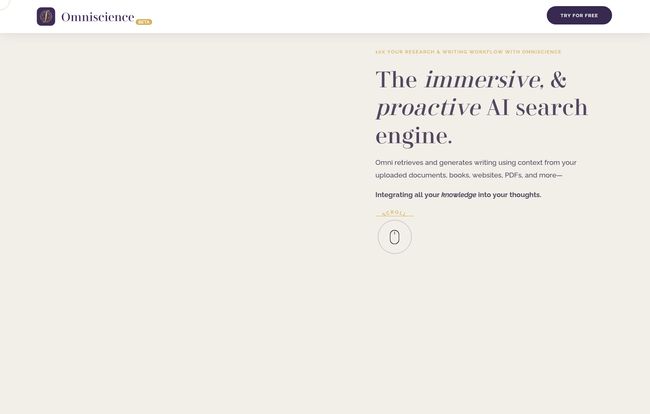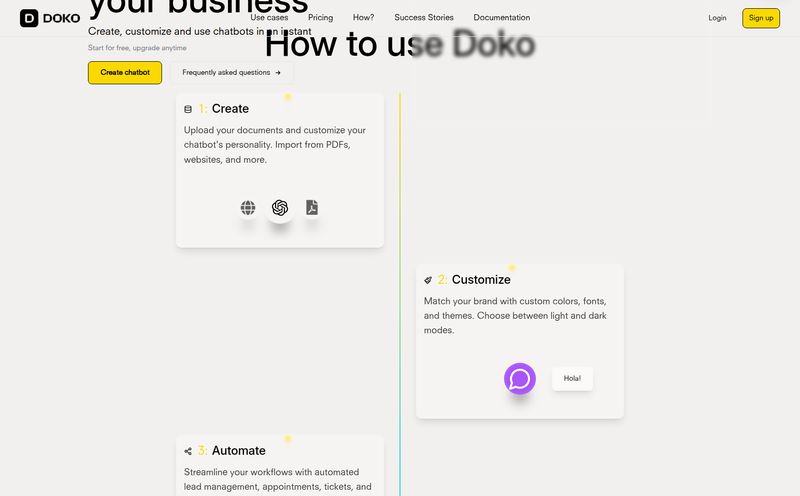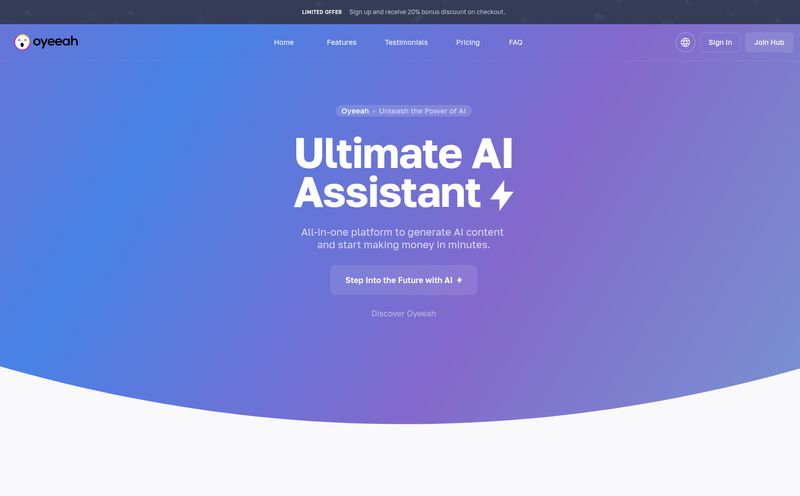My browser tabs are a war zone. I've got a graveyard of half-read articles, a smattering of Google Docs filled with frantic notes, and an Evernote account that looks like a digital hoarder's attic. This is my 'process' for writing anything substantial. It's organized chaos, and for years, I’ve told myself it’s just how creative genius works. Right?
Then the great AI content floodgates of 2023 opened. Suddenly, everyone had a magic button to churn out articles. But here’s the rub: a lot of it sounds… the same. It’s generic. Soulless. It lacks the specific flavor that comes from real research, from having a unique perspective built on a foundation of carefully curated knowledge. So, when I stumbled upon a tool called Omniscience AI, with its minimalist website and lofty promise of “integrating all knowledge into thought,” my inner cynic and my desperate-for-a-better-workflow self both sat up and paid attention.
Could this be it? An AI tool that doesn't just pull from the vast, generic ocean of the internet, but from my own, personal, chaotic library of knowledge? Let's find out.
What Exactly is Omniscience AI Anyway?
At its heart, Omniscience isn't just another GPT-wrapper. You’ve seen those a million times. This is different. The platform bills itself as an “AI-powered research and ChatGPT book writing tool,” which is a mouthful. What it really means is that you feed it your stuff. Your documents, PDFs, research papers, book notes, website clippings—your entire digital brain-dump. Then, it uses that specific knowledge base to help you write.

Visit Omniscience
Think of it less like a ghostwriter and more like a brilliant research assistant who has read everything you’ve ever saved and can recall it instantly. It's a proactive search engine for your own mind. Instead of you digging through folders trying to find that one statistic you read three months ago, Omniscience is designed to surface it for you, as you write. Now that’s an interesting proposition.
The Core Features That Caught My Eye
A tool is only as good as its features, right? Here’s what Omniscience brings to the table.
Writing With Your Personal Brain Trust
This is the main event. The ability to generate nuanced, domain-specific content is a huge deal. As an SEO, I know the value of expertise, authority, and trustworthiness (hello, E-E-A-T). Generic AI content often fails this test. But if an AI is writing with context from, say, a PhD’s entire research library or a company’s internal documentation, the output is going to be leagues ahead. It’s augmented writing, not just automated writing. You can connect it to your Google Drive, Notion, Evernote... basically, wherever your knowledge already lives.
The Omni Extension: A Proactive Research Buddy
Omniscience has an extension that promises to proactively retrieve information for you. While I haven't seen it in action myself, the concept is solid. Imagine you're writing about a topic and a little prompt appears, pulling a relevant quote or data point from a PDF you uploaded last year. It’s like having that little spark of memory, but outsourced to an algorithm. If it works as smoothly as it sounds, it could be a massive time-saver and a cure for writer's block.
Citations Without the Tears
Okay, anyone who has ever written a research paper, a thesis, or even a heavily-sourced non-fiction book just felt a shiver of excitement. The platform automates the citation process. It tracks where the information came from within your own documents and cites it for you. This alone could save countless hours of painstaking, soul-crushing work. Frankly, I'd consider using it for this feature alone. It’s a huge pain point for so many writers and researchers.
My Honest Take: The Good and The... Considerations
No tool is perfect, especially one still in beta. After digging in, here’s my unfiltered take.
What I really like is that Omniscience forces you to bring your own ingredients to the kitchen. It’s not a content microwave. The emphasis on using your own knowledge base is, in my opinion, the future of high-quality AI-assisted work. It promotes originality. The integrations with tools like Notion and Evernote are smart, meeting users where they already are. And the potential for teams to create a shared, compounding knowledge base is incredibly powerful for businesses that want to maintain a consistent, expert voice.
However, let's ground ourselves. The quality of what you get out of Omniscience is directly proportional to the quality of what you put in. The old “garbage in, garbage out” rule applies more here than ever. If your knowledge base is a mess of random, low-quality articles, your AI assistant will be equally unhelpful. It requires a significant amount of content to be truly effective. You can’t just upload two blog posts and expect it to write your magnum opus. This isn't a flaw, so much as a prerequisite. You have to do the work of curating your library.
Who is Omniscience Actually For?
This isn't a tool for the casual blogger looking to pump out 10 listicles a day. This is a power tool for a specific type of creator.
- Authors and Novelists: Especially those writing non-fiction or heavily researched fiction. Imagine uploading all your historical research, character notes, and world-building documents into one searchable brain.
- Academics and PhD Students: The combination of contextual writing and automated citations is a dream come true for anyone drowning in research papers.
- Expert Consultants and Coaches: People who have developed a unique framework or methodology can use Omniscience to write books and create materials that are deeply rooted in their own IP.
- Content Teams: A team can build a shared knowledge base to ensure all content aligns with the company's expertise and internal data, creating a truly unified brand voice.
If you're in one of those boats, Omniscience AI could be less of a tool and more of a partner.
The Million-Dollar Question: What About the Price?
And here we hit a small snag. As of my review, the pricing information isn't explicitly available on their landing page. You have to sign up to “Try For Free”. This is a bit of a pet peeve of mine. It could mean a few things: they might be targeting enterprise clients with custom plans, or they're still finalizing their pricing model since they are in beta. While understandable, transparent pricing builds trust. For now, you’ll have to take the plunge and sign up to see the costs.
Final Thoughts: Is Omniscience the Real Deal?
I came into this review skeptical, and I’m walking away... cautiously optimistic. And excited. Omniscience AI isn't trying to replace the writer. It's trying to build them a better brain. It's like the difference between a fast-food soda fountain that gives you any generic flavor you want, and a master sommelier who helps you pick the perfect wine from your own cellar to complement your meal.
It’s a tool for thinking, not just for outputting words. It asks you to be a curator, a librarian of your own intellect. In an age where anyone can generate a generic sentence, the real value lies in synthesis, connection, and a unique point of view. Omniscience seems to understand that. And for that reason, I’m keeping a very close eye on it.
Frequently Asked Questions about Omniscience
1. Can Omniscience AI write a full book for me automatically?
No, it's not a one-click book generator. It's designed to be a writing partner. It generates text, retrieves information, and helps you structure your thoughts based on the knowledge you've provided, but you are still the author driving the process.
2. What kind of documents can I upload to Omniscience?
You can upload a wide range of files, including PDFs, Word documents, text files, and even connect to existing knowledge bases like Google Drive, Notion, and Evernote to pull in your information.
3. Is my uploaded data private and secure?
While you should always review the privacy policy of any AI tool, Omniscience is built on the premise of using your private data. Their model should ensure your knowledge base is siloed and used only for your own content generation, not for training general models.
4. How is this different from just using ChatGPT with my notes?
The key difference is integration and proactivity. Omniscience creates a structured, searchable knowledge base and aims to surface relevant information as you write via its extension. It’s a more holistic system than copy-pasting notes into a standard chatbot, and its automated citation feature is a major advantage.
5. Is there a free trial for Omniscience AI?
Yes, their website features a "Try For Free" button, suggesting a free trial or a freemium plan is available to new users who sign up.
Reference and Sources
- Official Website: Omniscience.io
- An interesting read on Personal AI: Generative AI's Act Two by Sequoia Capital
- Knowledge Management Tool: Notion
- Note-Taking App: Evernote



